On Wednesday 7 March 2018, Hungary deposited its instrument of accession to the 2012 Strasbourg Convention on the Limitation of Liability in Inland Navigation (CLNI 2012) with the Secretary General of the Central Commission for the Navigation of the Rhine, the depository authority designated by the CLNI. The instrument of accession was deposited by the Ambassador, Mrs Ágnes Kertész, Hungary’s Permanent Representative to the Council of Europe.
After Serbia in 2013 and the Grand Duchy of Luxembourg in 2014, Hungary is the third country to become a Party to the Convention adopted following the Diplomatic Conference concluded on 27 September 2012. The Convention, available to be signed by all countries from 27 September 2012 to 26 September 2014, had been signed by seven countries: Germany, Belgium, France, Luxembourg, the Netherlands, Poland and Serbia.
The Hungarian act of accession marks a new phase in the entry into force of CLNI 2012 which, in addition to four required ratifications, acceptances, approvals or accessions, also depends on the termination of the 1988 Strasbourg Convention. It is also a perfect illustration of one of the raisons d’être of CLNI 2012, which aimed precisely to extend the Convention’s geographical field of application beyond the Rhine and the Moselle. Furthermore, the revised 2012 Convention increases limits of liability, thereby enhancing the protection of tourist navigation passengers.

ABOUT THE CCNR
The Central Commission for the Navigation of the Rhine (CCNR) is an international organisation that exercises an essential regulatory role in the navigation of the Rhine. It is active in the technical, legal, economic and environmental fields. In all its areas of action, its work is guided by the efficiency of transport on the Rhine, safety, social considerations, and respect for the environment. Many of the Central Commission’s activities now reach beyond the Rhine and are directly concerned with European navigable waterways more generally. The Central Commission works closely with the European Commission as well as with the other river commissions and international organisations.
